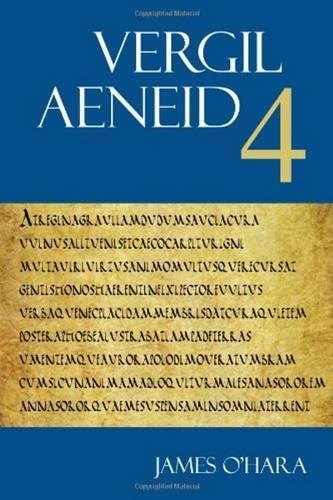
Aeneid 4
(Paperback, New edition)
Publishing Details
Aeneid 4
By (Author) Vergil
Edited by Prof. James J. O'Hara
Edited by Randall T. Ganiban
Focus Publishing/R Pullins & Co
Focus Publishing/R Pullins & Co
15th September 2011
New edition
United States
Classifications
Tertiary Education
Non Fiction
Ancient, classical and medieval texts
Literary studies: ancient, classical and medieval
873.01
Physical Properties
Paperback
160
Width 152mm, Height 228mm, Spine 11mm
226g
Description
This edition is part of a new series of commentaries on the Aeneid. Each volume is edited by a scholar of Roman epic and designed with the needs of today's college Latin students in mind. A two-volume edition of all books in the Aeneid will be derived from the series. This is Book Four in the series.
Reviews
"The commentary itself is a gem, and students and teachers of Aeneid 4 alike will be very grateful to James O'Hara for the excellent job he has done to balance comments that help with translation and comprehension alongside those that allow students to engage with current scholarly debates about the interpretation of the Aeneid, as well as with Virgil's literary, philosophical and cultural contexts... In conclusion, this is an engaging, learned and extremely useful commentary. It is well-directed to its intended audience of intermediate students but is also a useful resource for more advanced readers, particularly those wanting insight into the current state of scholarship on the Aeneid and significant recent debates about Book 4. It is lucid and well edited, and I highly recommend it." - Anne Rogerson, University of Sydney, Bryn Mawr Classical Review 2012.04.08 The new Vergil commentaries from Focus are an exciting resource for almost anyone reading the Aeneid in Latin... The editors recognize that developing core reading skills and involving students in the interpretive questions raised by the poem are not separate objectives. This recognition has resulted in commentaries that enticingly present basic information in a wider setting of observation and enquiry... All in all, the Focus series balances simplicity and subtlety, reminding students at all levels that increasing technical precision and stretching one's interpretive curiosity are-fundamentally-one endeavor. -Antonia Syson, Purdue University [Teaching Classical Languages (CAMWS) Volume 1.1, Fall 2012] This commentary is elegantly written in language so free of jargon that it can be understood by those reading Vergil for the first time, while the attention paid to the semantic penumbrae of Vergilian words, phrases, and passages and the views expressed will interest Vergilians of all levels. - Raymond C. Clark, University of Ottawa, New England Classical Journal Volume 39.3 http://tcl.camws.org/view.phpfile=fall2012/Syson.pdf -- Antonia Syson Teaching Classical Languages, Fall 2012, p.52 20130108
Author Bio
James O'Hara is the George L. Paddison Professor of Latin at the University of North Carolina at Chapel Hill. He is the author of Death and the Optimistic Prophecy in Vergil's Aeneid (Princeton 1990), True Names: Vergil and the Alexandrian Tradition of Etymological Wordplay (Ann Arbor 1996), and Inconsistency in Roman Epic: Studies in Catullus, Lucretius, Vergil, Ovid and Lucan (Cambridge 2007).
